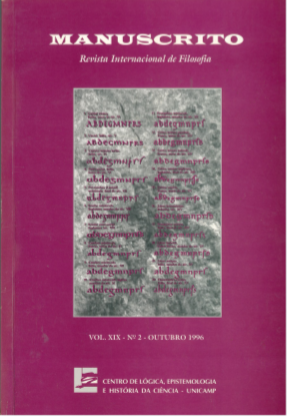Resumo
In this paper I provide a solution to the problem of the Chinese Room. The problem is to determine whether the Chinese Room Argument goes through, and if it does, to explain why symbol handling does not give us cognition. I argue that the real issue is not about symbols, but about the relationship between cognition and content. Artificial Intelligence (AI) does not distinguish between these, and naively believes that internalising the public symbolisms that express the content of cognition will generate cognition itself. Not only does it do this in practise: the main manifestos of AI explicitly state that the internalised symbolisms are interpretted and contentful. This confusion between cognition and content is the same confusion that underlies psychologism, which says that we can find out about content by studying cognition. What I call "reverse psychologism" says that we can find out about cognition by studying content, and in its stronger form, that we can generate cognition by internalis ing content. This is the real fallacy that is exposed by the Chinese Room Argument.
Referências
Amble, T. (1987). Logic Programming and Knowledge Engineer ing. (Wokingham, Addison-Wesley).
Barr, A & Feigenbaum, E. A. (1981). The Handbook of Artificial Intelligence, vol. I. (Reading Mass., Addison-Wesley).
Burton, R. (1982). Diagnosing Bugs in a Simple Procedural Skill, in Sleeman, D. & Brown, J., (eds.) Intelligent Tutoring Systems. (London, Academic Press).
Burton, R. & Brown, J. (1978). Diagnostic Models for Procedural Bugs in Basic Mathematical Skills, Cognitive Science, 2.
Charniak, E. & Mcdermott, D. (1982). Introduction to Artificial Intelligence. (Reading, Mass., Addison-Wesley).
Chomsky, N. (1965). Aspects of the Theory of Syntax. (Cam bridge, Mass., MIT Press).
Chomsky, N. (1968). Language and Mind. (New York, Harcourt, Brace & World). Extended edition, 1972.
Chomsky, N. (1969). Some Empirical Assumptions in Modern Philosophy of Language, in S. Morgenbesser, P. Suppes & M. White, (eds.) Philosophy, Science, and Method: Essays in Honor of Ernest Nagel. (New York).
Chomsky, N. (1970). Problems of Explanation in Linguistics, in Borger & F. Cioffi, (eds.) Explanation in the Behavi Sciences (New York, Cambridge University Press).
Chomsky, N. (1980). Rules and Representations. (Oxford, Basil Blakwell).
Chomsky, N. (1984). Changing Perspectives on Knowledge and Use of Language. Paper presented at a Sloan Conference, MIT, May 1984.
Chomsky, N. (1988). Language and Problems of Knowledge: The Managua Lectures. (Cambridge MA, MIT Press).
Churchland, P. M. & Churchland, P. S. (1990). Could a Machine Think? Scientific American, 262: 1.
Cussins, A. (1990). The Connectionist Construction of Concepts, in Boden, M. (ed.) (1990), The Philosophy of Artificial Intelligence. (Oxford, Oxford University Press).
Dennett, D. (1987). The Intentional Stance. (Cambridge MA MIT Press).
Fodor, J. (1975). The Language of Thought. (New York, Thomas Y. Crowell).
Frege, G. (1967). The Basic Laws of Arithmetic. (Berkeley, University of California Press).
Gettier, E. (1963). Is Justified True Belief Knowledge? Analysis, 23.
Hinton, G. (1995). Learning in Parallel Networks, Byte, April, pp. 265-273.
Hinton, G. (1996). Learning Distributed Representations of Concepts, Proceedings of the Eighth Annual Conference of the Cognitive Science Society. (Amherst MA.) pp.1-12.
Husserl, E. (1962). Ideas - General Introduction to Pure Phenomenology. (New York, Macmillan).
Husserl, E. (1970). Logical Investigations, I. (New York, Humanities Press).
Katz, J. (1981). Language and Other Abstract Objects. (New Jersey, Rowman & Littlefield).
Macnamara, J. (1986). A Border Dispute: The Place of Logic in Psychology. (Cambridge MA, MIT Bradford).
Mill, J.S. (1843). A System of Logic. (London).
Mill, J.S. (1865). Examination of Sir William Hamilton's Philosophy. (London).
Miller, M. (1982). A structured Planning and Debugging Environment for Elementary Programming, in Sleeman, D. & Brown, J., eds, Intelligent Tutoring Systems. (London, Academic Press).
Newell, A. & Simon, H. A. (1976). Computer Science as Empirical Enquiry: Symbols and Search, Communications of the Association for Computing Machinery, 9, March, pp. 113-126. Page references are to its reprint in Haugeland, J. (ed.), Mind Design: Philosophy, Psychology, Artificial Intelligence (Cambridge MA, MIT/Bradford), 1981.
Rich, E. (1983). Artificial Intelligence. (Auckland, McGraw Hill).
Schank, R. C. & Abelson, R. P. (1977). Scripts, Plans, Goals and Understanding. (Hillsdale, Laurence Erlbaum Associates).
Searle, J. (1980). Minds, Brains, and Programs. The Behav ioral and Brain Sciences, 3.
Searle, J. (1990), Is the Brain's Mind a Computer Program? Scientific American, 262: 1.
Sejnowski, T. & Rosenberg, C. (1986). NETtalk: a Parallel Network that Learns to Read Aloud, John Hopkins Electrical Engineering and Computer Science Technical Report, JHU/EEC-86/01.
Smith, B. C. (1985). Prologue to Reflection and Semantics in a Procedural Language, in R. Brachman & H. Levesque, (eds.), Readings in Knowledge Representation. (Los Altos Morgan Kaufmann).
Smith, B. C. (1991). The Owl and the Electric Encyclopedia, Artificial Intelligence, 47
Wittgenstein, L. (1961). Tractatus Logico-Philosophicus. (London, Routledge & Kegan Paul). (Original German edition published 1921).
Wenger, E. (1987). Artificial Intelligence and Tutoring Systems. (California, Morgan Kaufmann Publishers).
Young, R. & O'shea, T. (1982). Errors in Children's Subtraction, Cognitive Science, 5.

Este trabalho está licenciado sob uma licença Creative Commons Attribution 4.0 International License.
Copyright (c) 1996 Manuscrito: Revista Internacional de Filosofia

